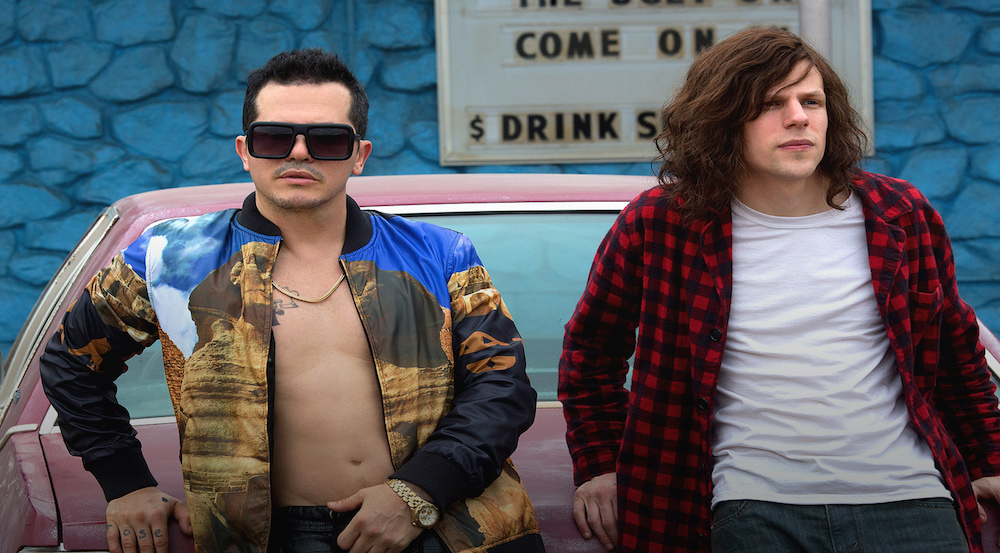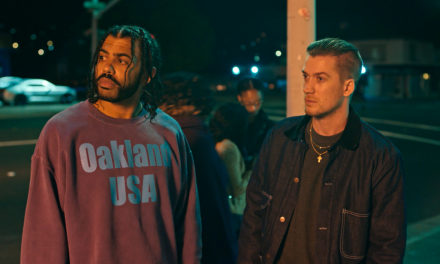
Jesse Eisenberg and Kristen Stewart in a promotional poster for American Ultra. Courtesy of Lionsgate.
The mixed reaction is likely the hardest to process for any filmgoer or, really, any person. Human nature is to classify our experiences into good and bad. So when anything is a mix of both, it tends to get shoved under the rug.
What am I saying with my clearly brilliant insights into human nature? I’m saying that if you hate watching anything that has fantastic ideas mixed with absolute duds, boy American Ultra is NOT the movie for you.
American Ultra is, on its surface, an idea that I should be all over. It is written by Max Landis, screenplay creator of 2012’s Chronicle and a tireless champion for original ideas in Hollywood (as well as being the only screenwriter with a face). American Ultra stars Jesse Eisenberg and Kristen Stewart, both actors who can be fairly compelling on their own and who have also proven to have a remarkably potent chemistry together in 2009’s Adventureland. And it’s an original IP that features a genre twist which pulls on conventions in a new way — something a Hollywood film could always use.
Yet something about the film doesn’t quite work as well as it should, something about it is off. So, to find out what that is, we’re going to look at Max Landis’ description of the film as a “romantic action stoner comedy” and break that out into its three parts to discover what went wrong.
This is director Nima Nourizadeh’s second film, the first being the unfortunate Project X in 2012. While that party movie didn’t really display a lot of storytelling skill, it did display the ultimately kinetic style that ends up being fully realized in the more action-oriented American Ultra.
A large part of American Ultra is the story of Mike Howell (Jesse Eisenberg) feeling out his activation as a sort of Manchurian Candidate-style super spy. Nourizadeh’s particular signature is a creative use of the environment, which, while it could bear some explaining in the world of the film, does lend a freshness to what ultimately amounts to competently filmed shoot-outs as the primary mode of action. Perhaps the only drawback to the construction of the action sequences is a lack of truly memorable opponents.
The film has enough bizarre character in its protagonists that the largely faceless (or personality-less in the main villain’s case) feel like an oversight. In fact, the only one who really works is Laugher, played by the incomparable Walton Goggins. His scenes emphasize the heightened violence and constant motion the film gallops into once Howell is activated, which perhaps points to what this film could have been had there been a stronger antagonist.
Discussing the weakness of the antagonists in this movie also allows us to bring up what is likely the weakest point of the film: the CIA sections. As I stated earlier, Howell is activated as a super spy. It’s revealed in the film that this is the something similar to the MKUltra program, a declassified program from the 60s in which the CIA researched mind control techniques
While this could have been an interesting mystery as we slowly begin to unravel what happens, the film chooses to reveal the CIA hand incredibly early on and then spends a great deal of time dealing with problems of our CIA hero, Lasseter (Connie Britton) and CIA villain Yates (Topher Grace). And this stuff is dishwater-dull and paint-drying boring.
The style and life leaves the film to deal with limp insults and boring hallways. In fact, I have a suspicion that this material was added later in production. The later entry of the CIA into the sleepy West Virginia town to deal with our hero feels infinitely more natural, highlighting how much of a drag much of the CIA material is and how irrelevant and stitched on it feels to the narrative.
Now to move onto stoner comedy, which, unfortunately, is the other major weak point of the film. A stoner comedy has two aspects. It must be funny, obviously, and the stoner culture must somehow influence the nature of the film. Unfortunately, neither is really true in American Ultra. There are a few lines that’ll make you smile here and there, but I honestly cannot recall truly laughing throughout the movie.
And the stoner culture, despite being a keystone to the the film’s marketing, doesn’t really influence the movie. It’s implied to be a crutch left by Howell’s mind control, but little else is done with it. Had Howell been playing video games or drinking or sleeping, it’s likely that there would have been little effect on the plot. So, I feel reluctant to call this a stoner comedy at all.
The action is mixed, but overall good. And the stoner comedy is almost non-existent. So you’re probably asking what those fantastic ideas I talked about earlier are exactly.
Well, that rests in that final genre descriptor — romance. Phoebe (Kristen Stewart) and Mike’s relationship is the driving force of the film, and it’s legitimately phenomenal. For romantic stories, the biggest problem you can run into is when the couple on screen isn’t believable.
American Ultra not only succeeds in making you believe it, but it excels by creating a completely natural and realistic relationship that is compelling to watch. Mike is a nervous wreck who is kept together by Phoebe, and all the while, he fears that he’s holding her back — even though he wants to marry her. Yet when you watch of the two of them together, you really do see what they get from each other and why their relationship works so well. When the film makes the relationship the driving force, the film in its entirety seems to snap into focus. Seriously, the performances work better, the action works better — it’s a better film.
And while I haven’t talked much about it, the film’s leads are really good. While the supporting cast is largely made up of non-entities present merely to fill out necessary roles, Eisenberg and Stewart are a compelling screen couple, with Stewart actually managing to fill out a really strong role. Landis said that in his potential sequel to this film (before the unfortunate box office returns), Stewart’s Phoebe would become the central character, and based on this one, I’d want to see that.
American Ultra is a very flawed film. It’s one with a lot of stuff that just doesn’t work or feels half-formed. But when it does fire, it’s a very unique experience. This messy action romance is by no means for everyone, but if you’re predisposed to to like this film as I like it, it could provide you good fun.
2 Activation Phrases out of 4
Opinion Editor | Brandon Wagner is a College Senior from God Only Knows Where, America studying Film and Media Studies with a minor in Religion. This is his first year for the Wheel, in a likely misguided experiment to be a film critic. When he's not writing on the biggest blockbusters or the films of Spike Jonze or Andrei Tarkovsky or Zack Snyder, he's writing on comedic television, the future of gaming as an art, or the relationship between audience and cinematic experience. In other words, Brandon Wagner has basically nothing else going on but this.






